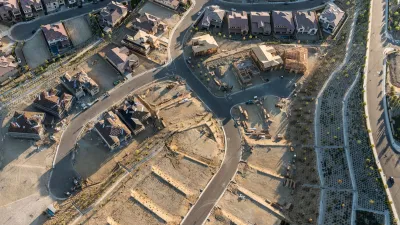The second and third parts in resiliency expert Dave Hampton's 3-part series on what the California fires teach us about preparing for climate change.

In this three part series, resiliency expert Dave Hampton examines the recent California fires for lessons on preparing for the increasing number of disasters anticipated in connection with a warming global climate. In the first part, also summarized in Planetizen, Hampton discussed the difference between "attribution" and "contribution" when discussing the role of climate change in natural disasters.
In the second part, Hampton notes that use of the term "wildfires" is distracting. The "wildland-urban interface" (or WUI) must be the focus of preparation and prevention efforts. WUI “refers to the zone of transition between unoccupied land and human development. Communities that are within 0.5 miles (0.80 km) of the zone may also be included.” (Citing Radeloff et al. (2005))
In the third part, Hampton discusses key concepts from the International Wildland-Urban Interface Code (IWUIC). He then goes on to discuss some recent failures due, in part, to outdated models and maps, and the need to be proactive in developing new fire and flood maps and codes. For more details, read the source article.
FULL STORY: Lessons from the California Fires: Climate Change Impacts and Proactive Planning (part 3)

Planetizen Federal Action Tracker
A weekly monitor of how Trump’s orders and actions are impacting planners and planning in America.

Maui's Vacation Rental Debate Turns Ugly
Verbal attacks, misinformation campaigns and fistfights plague a high-stakes debate to convert thousands of vacation rentals into long-term housing.

San Francisco Suspends Traffic Calming Amidst Record Deaths
Citing “a challenging fiscal landscape,” the city will cease the program on the heels of 42 traffic deaths, including 24 pedestrians.

Defunct Pittsburgh Power Plant to Become Residential Tower
A decommissioned steam heat plant will be redeveloped into almost 100 affordable housing units.

Trump Prompts Restructuring of Transportation Research Board in “Unprecedented Overreach”
The TRB has eliminated more than half of its committees including those focused on climate, equity, and cities.

Amtrak Rolls Out New Orleans to Alabama “Mardi Gras” Train
The new service will operate morning and evening departures between Mobile and New Orleans.
Urban Design for Planners 1: Software Tools
This six-course series explores essential urban design concepts using open source software and equips planners with the tools they need to participate fully in the urban design process.
Planning for Universal Design
Learn the tools for implementing Universal Design in planning regulations.
Heyer Gruel & Associates PA
JM Goldson LLC
Custer County Colorado
City of Camden Redevelopment Agency
City of Astoria
Transportation Research & Education Center (TREC) at Portland State University
Jefferson Parish Government
Camden Redevelopment Agency
City of Claremont





























